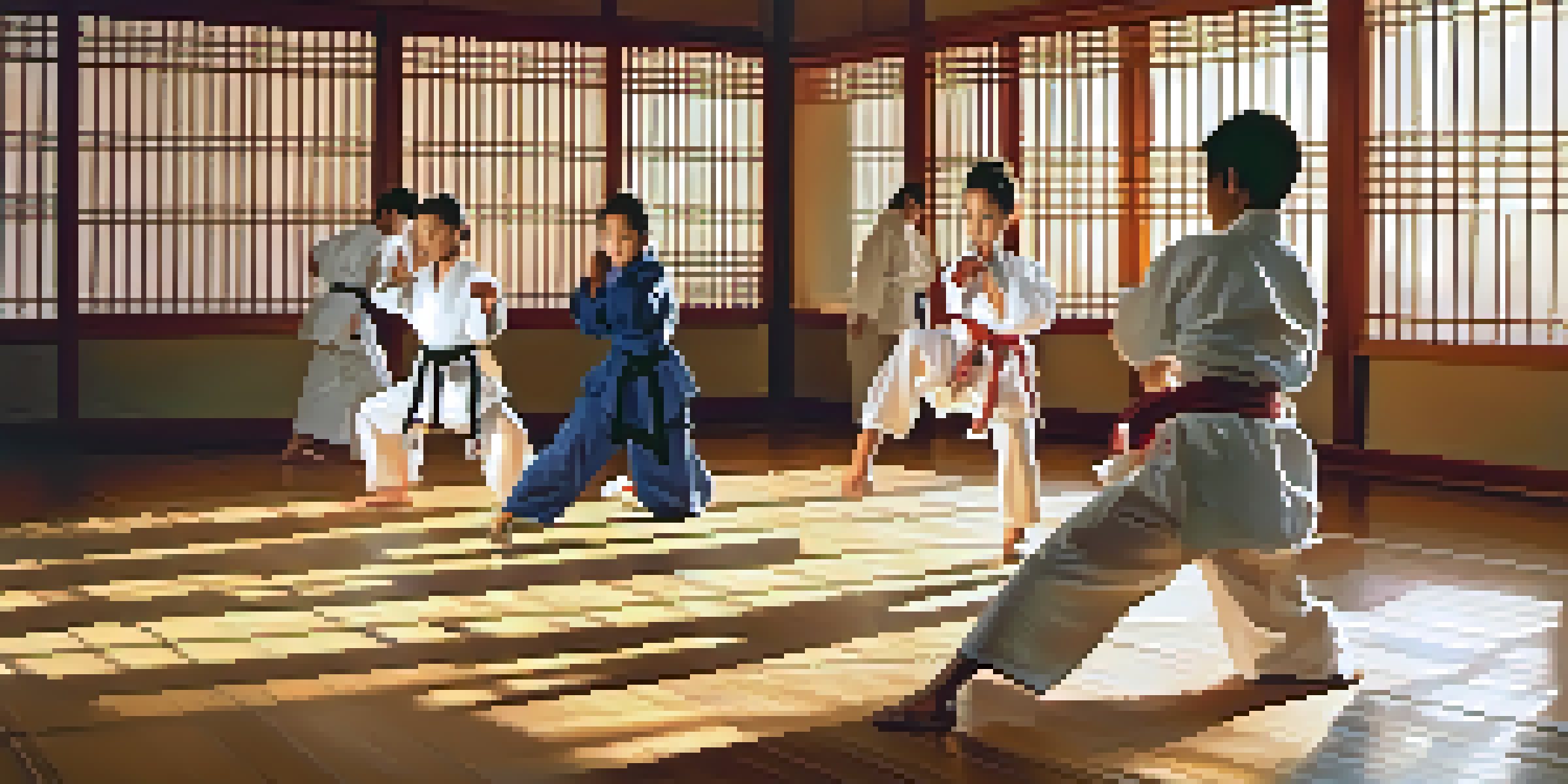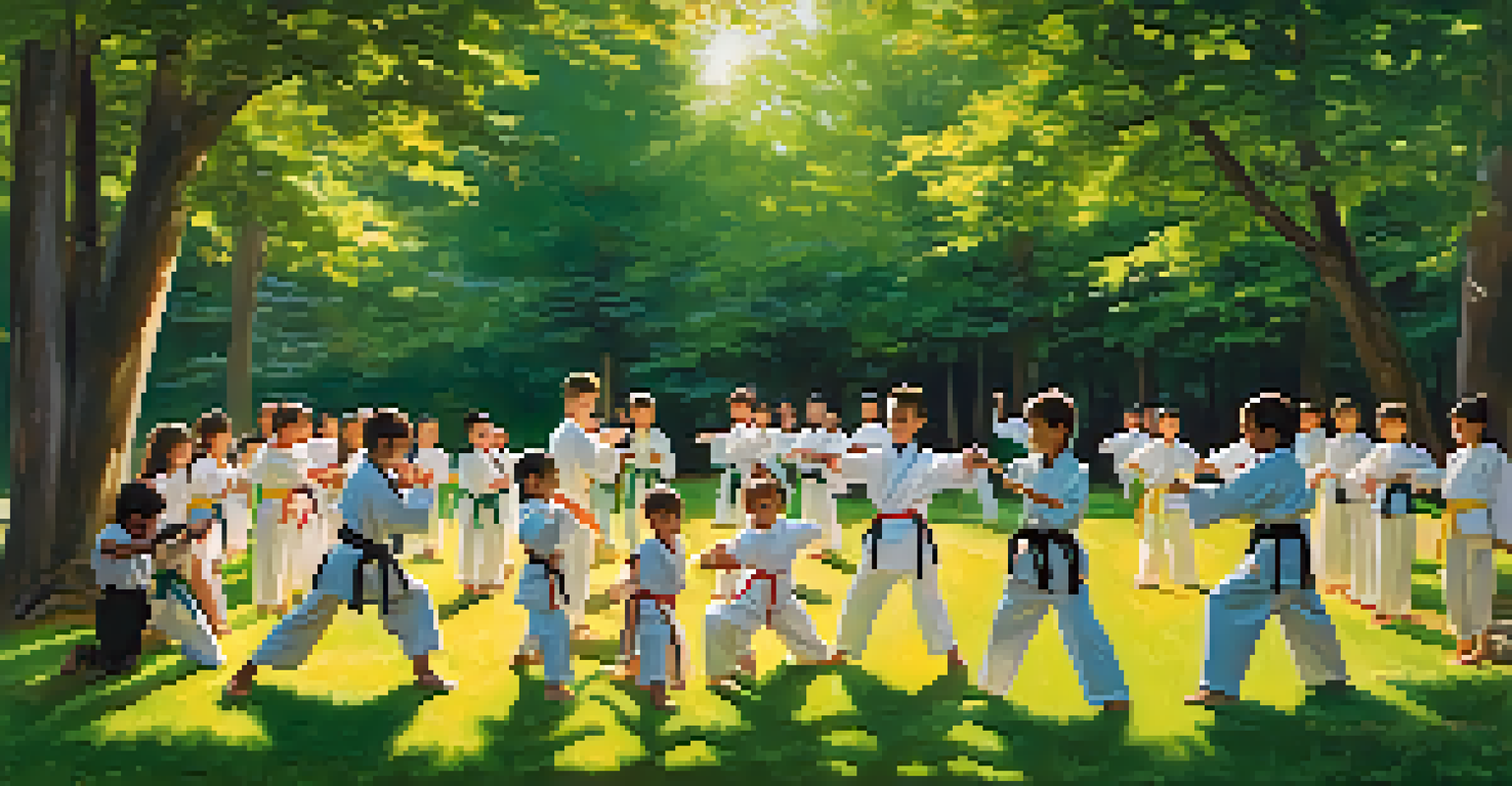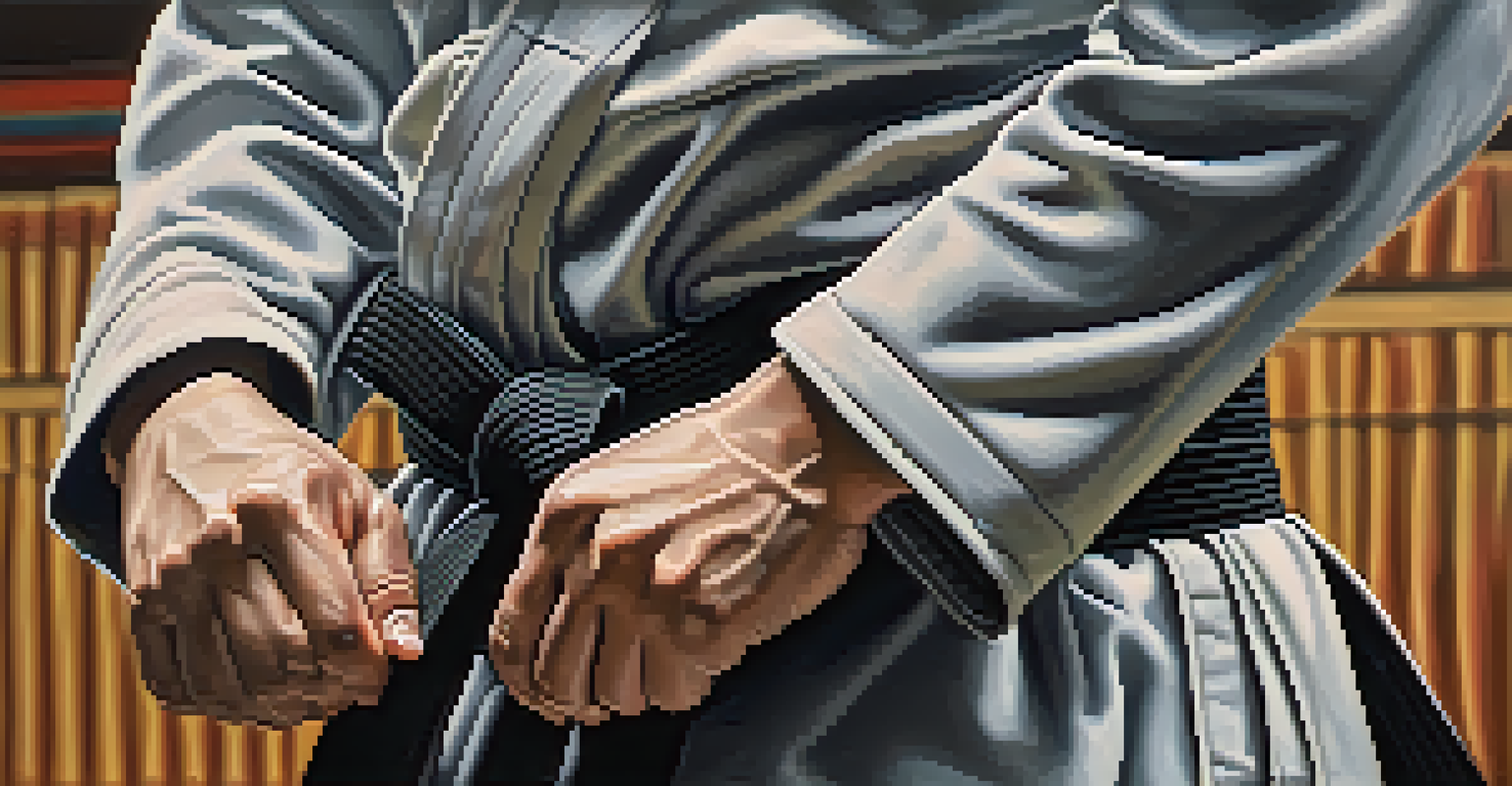Martial Arts as a Preventive Health Strategy Worldwide

Understanding Martial Arts and Its Health Benefits
Martial arts encompass a variety of disciplines, including karate, judo, and taekwondo, each offering unique techniques and philosophies. These practices not only improve physical fitness but also promote mental well-being. Engaging in martial arts can enhance coordination, strength, and flexibility, which are essential for overall health.
Martial arts are a way of life. You have to be committed to it physically, mentally and emotionally.
Moreover, martial arts often incorporate elements of mindfulness and focus, leading to reduced stress levels and improved mental clarity. This holistic approach helps practitioners develop a sense of discipline and self-control, which can be beneficial in daily life. As a result, martial arts serve as a comprehensive strategy for maintaining both physical and mental health.
These practices have gained popularity worldwide, with many people turning to martial arts not just for self-defense, but as a means to improve their overall quality of life. The international appeal of martial arts demonstrates their effectiveness as a preventive health strategy, making them accessible to diverse populations.
Martial Arts and Physical Fitness
One of the most significant benefits of martial arts is its ability to enhance physical fitness. Regular training sessions can significantly improve cardiovascular health, muscle strength, and endurance. As participants engage in various drills and sparring, they work multiple muscle groups, leading to a more balanced physique.

In addition to building strength, martial arts training often includes high-intensity workouts that can boost metabolism and aid in weight management. Many practitioners find that the engaging nature of martial arts makes it easier to stick with a regular fitness routine compared to traditional workouts. This consistency can lead to long-term health benefits and a lower risk of chronic diseases.
Holistic Health Benefits of Martial Arts
Martial arts improve physical fitness and mental well-being through enhanced coordination, strength, and mindfulness.
Furthermore, martial arts can be adapted to suit different fitness levels and ages, making it a versatile option for individuals seeking to improve their health. From children to seniors, anyone can benefit from the physical activity that martial arts provide, promoting a culture of fitness across generations.
Mental Health Benefits of Martial Arts Training
The mental health benefits associated with martial arts are profound and multifaceted. Practitioners often report decreased anxiety, improved mood, and enhanced self-esteem. The focus required during training allows individuals to escape daily stressors, fostering a sense of calm and mental clarity.
The ultimate aim of martial arts is not having to use them.
Moreover, the discipline learned in martial arts can translate to other areas of life, helping individuals manage stress more effectively. Techniques such as controlled breathing and meditation, often integrated into martial arts training, can provide valuable tools for coping with life’s challenges. This mental resilience is crucial for maintaining emotional well-being.
In many communities, martial arts are also seen as a supportive social environment. The camaraderie built in training sessions can lead to lasting friendships, further enhancing mental health through social interaction. This sense of belonging and support is essential for individuals seeking to improve their mental health.
Martial Arts as a Community-Building Activity
Martial arts classes often bring together diverse groups of people, fostering a sense of community and belonging. This collective environment encourages individuals to support one another, creating friendships that extend beyond the dojo or training hall. Such connections can enhance social skills and combat feelings of loneliness.
Many martial arts schools also engage in community initiatives, such as self-defense workshops or outreach programs for at-risk youth. These efforts not only promote the benefits of martial arts but also contribute to a safer and more connected community. By empowering individuals through martial arts, communities can cultivate resilience and cooperation among their members.
Community and Social Connections
Martial arts foster a sense of belonging and support, helping to combat loneliness and build friendships.
Additionally, participating in martial arts competitions can help build a sense of pride and accomplishment. These events provide opportunities for individuals to showcase their skills, receive recognition, and strengthen bonds with fellow practitioners. The shared experience of competition can create lasting memories and deepen community ties.
Cultural Significance of Martial Arts Worldwide
Martial arts are deeply rooted in various cultures around the globe, reflecting the values and traditions of their origins. For instance, karate is a significant part of Japanese culture, while Brazilian jiu-jitsu embodies Brazilian heritage. Understanding these cultural contexts can enrich one’s martial arts experience and appreciation.
Many martial arts emphasize respect, humility, and perseverance, values that resonate universally. By practicing these disciplines, individuals not only improve their physical health but also learn important life lessons. This cultural enrichment can foster greater empathy and understanding among diverse populations, bridging gaps between people from different backgrounds.
Moreover, the global spread of martial arts has led to the blending of techniques and styles, creating new forms of practice that appeal to a wide audience. This evolution showcases the adaptability of martial arts, making them relevant and effective in promoting health and well-being across cultures.
Martial Arts for Children: Building Future Generations
Introducing martial arts to children can have a lasting impact on their development. Not only does it encourage physical activity, but it also instills important values such as discipline, respect, and teamwork. These foundational qualities contribute to a child’s overall character and can positively influence their behavior in school and at home.
Martial arts training can also help children develop confidence as they learn new skills and achieve belts or ranks. This sense of accomplishment can motivate them to pursue other challenges in life, fostering a growth mindset. Additionally, the social aspect of martial arts allows children to make friends and learn the importance of collaboration.
Cultural Richness and Adaptability
Martial arts reflect diverse cultural values and continue to evolve, making them relevant for promoting health globally.
Parents often find that martial arts provide a constructive outlet for energy, reducing the likelihood of behavioral issues. With trained instructors guiding the process, children learn self-control and conflict resolution, equipping them with tools to navigate social interactions. In this way, martial arts contribute to healthier future generations.
The Future of Martial Arts in Preventive Health
As awareness of martial arts' health benefits continues to grow, more healthcare professionals are recommending these practices as part of preventive health strategies. Research supporting the physical and mental advantages of martial arts is becoming more prevalent, encouraging individuals to incorporate them into their wellness routines. This shift could lead to a broader acceptance of martial arts in traditional healthcare settings.
Moreover, technological advancements are making martial arts training more accessible. Online classes and virtual training sessions allow people to participate from the comfort of their homes, reaching a wider audience than ever before. This accessibility can help individuals incorporate martial arts into their daily lives, regardless of location or ability.

Looking ahead, the integration of martial arts into community wellness programs could amplify its preventive health impact. By promoting martial arts as a viable option for maintaining health, communities can encourage active lifestyles and foster a culture of well-being that benefits everyone. The future looks bright for martial arts as a preventive health strategy worldwide.